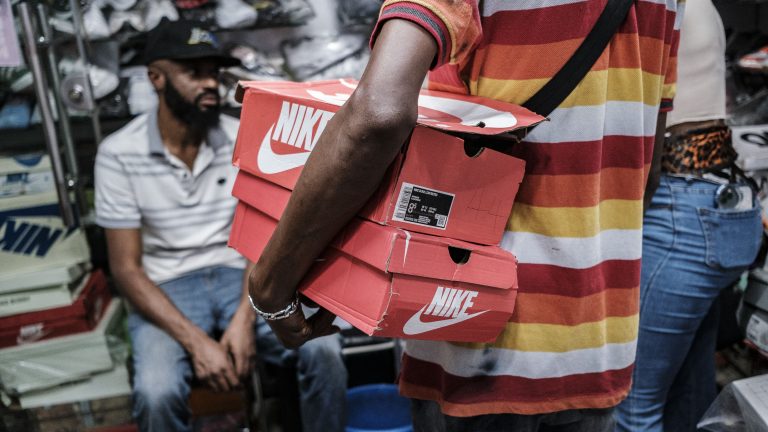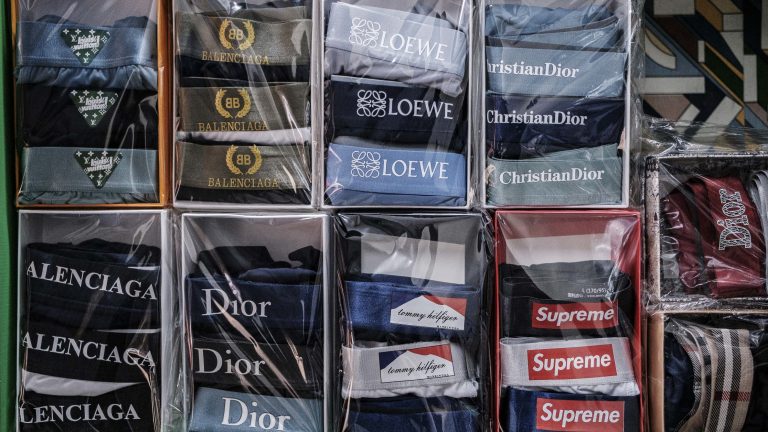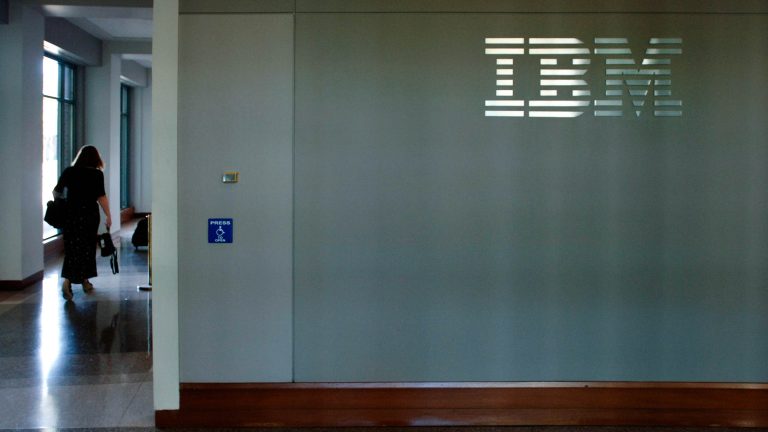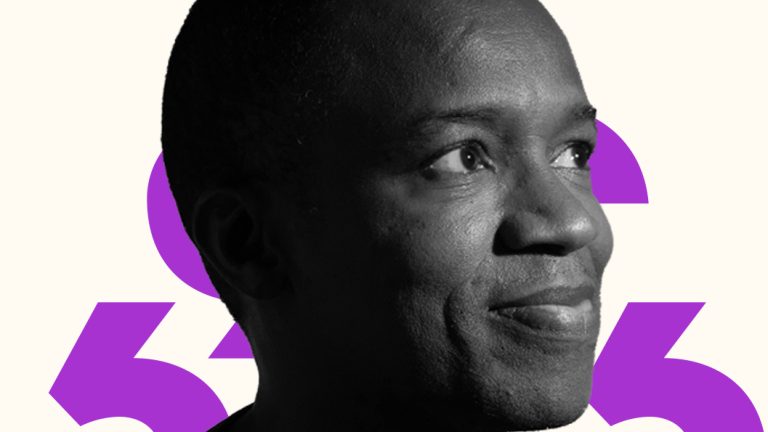On a windy September afternoon at Balogun Market, a popular textile and fashion market in Lagos, small traders displayed their wares. Some spread into the road, causing traffic to back up and forcing pedestrians to step around them.
Many of the items for sale looked familiar. Some traders sold shoes bearing logos reminiscent of the Nike swoosh or Adidas’ three stripes — but sporting a different name. Other products featured labels with one or two letters omitted, added, or switched to create recognizable brand names: Clothing branded Aidads, Baiencglaca, Berbuery, and Guccy hung on rails or was displayed on the floor. The foot soldiers of bigger traders who can afford to rent store space inside moved around the market, sweet-talking customers and dragging them by their hands and shirts to their stores. “Original designer jeans, belts, shoes; follow me and I’ll give you wholesale price,” one said, flashing business cards with tiny pictures of products for sale in front of customers’ faces.
In Nigeria, these knockoffs or counterfeits are known as “fake originals.” Modeled on popular sports or luxury brands, they cost a fraction of the price of an original. And before reaching Nigerian customers like those at Balogun Market, they often start their journey on Chinese shopping platforms.
Despite years of legal wrestling and promises of crackdowns and embedded anti-counterfeiting tools, many Chinese e-commerce platforms are rife with imitations of beloved global apparel brands. The U.S. government has identified websites, including AliExpress, Taobao, and DHgate, as “notorious markets” for counterfeiting and piracy. But it is still incredibly easy to find fake branded goods of variable quality on these platforms. Would you like a Dolce & Gabbana dupe handbag for less than $20? How about a cheap pair of Fikes, or maybe Mikes? Rest of World spoke with 40 traders at the market, 35 of whom said they got their goods from Chinese platforms or directly from manufacturers they had met on Chinese platforms and since built relationships with.

Before the rise of the Chinese e-commerce sites, acquiring used clothes was the most common way many Nigerians sourced designer apparel, according to Ganiu Adewuyi, an operations manager at ABSAS Nigeria Limited who has worked in importation and exportation in Africa for over 30 years. Traders used to import bales of secondhand designer and sports clothes from all over the world, including Europe, the U.S., and also neighboring countries like the Republic of Benin. Although the used-clothes market is still active in Nigeria, many traders now also sell fake originals sourced from China alongside these products.
A similar story has played out elsewhere. In the U.S., for instance, counterfeits made in China were previously largely sold on street corners or in markets. But with the rise of e-commerce, they are now often bought and sold online, both on Chinese platforms and U.S. sites like Amazon and eBay.
“Once there’s a demand for these, there will always be room for people to bring in the knockoffs.”
Deepankar Rustagi, co-founder and CEO of Lagos-based B2B e-commerce platform OmniBiz Africa, told Rest of World that fake originals have been making rounds in Nigeria for over a decade, and China has always been the supplier. But previously, people could obtain these goods only by traveling to China and bringing them back. “I grew up in Ikorodu [a suburban area of Lagos], and back in 1996, 1997, you could still buy a Rolex watch coming from China,” Rustagi said. “[But] the market has become structured because of e-commerce.” Before, he said, sellers would have to guess which sizes of products would most be in demand, but now they can be much more responsive to customers’ needs. Rustagi said the advancement of the Chinese e-commerce industry has helped digitize and scale the country’s fake originals market. With a small amount of money, anyone can order a small quantity of goods and become an entrepreneur.
China has made efforts to clamp down on the online counterfeits market, including introducing a law in 2019 aimed at holding e-commerce platforms — not just individual sellers — more accountable. The country also sometimes impounds and destroys fake products. E-commerce platforms like Alibaba and its partners have launched their own technical and administrative efforts to reduce counterfeits on their platforms. But it’s as if as soon as one counterfeit link is reported and deleted, another emerges.
Nigerian lawmakers have discussed clamping down on counterfeit products, including fake apparel. But the lack of specific laws and robust enforcement mechanisms makes it difficult, Adeniyi Duale, partner at Lagos-based law firm Duale, Ovia & Alex-Adedipe, told Rest of World. “Nigeria has also engaged in discussions with Chinese authorities to address the issue at its source,” he said. “Furthermore, despite the efforts of the Nigerian government, border controls are not strong enough, and porous borders can make it easier for counterfeit products to enter the country.”
“Over 90% of [fashion brands] we sell in Nigeria are knockoffs and predominantly from the Chinese or Asian side of the world,” Ochije Nnani, an e-commerce veteran and co-founder of Fazsion, a Lagos-based wholesale fashion marketplace, told Rest of World. “Nigerians want to look good; they want to wear what they see on the TV. But they do not have the buying power to buy these items. Once there’s a demand for these, there will always be room for people to bring in the knockoffs.”
Many of the platforms selling these wares are specifically aimed at resellers. On wholesale sites like YiToo and the Alibaba-owned 1688, a pair of Nike or Adidas dupes can go for lower than $10 if you buy more than two pairs. (In an email to Rest of World, Alibaba said its platforms have strict policies in place to deal with sellers who violate product listing rules.)
Lagos-based Namang Banah, 33, started reselling wholesale goods in 2018, when he was in Hunan province on a scholarship to study Chinese. At the time, Nigerians had started shopping on AliExpress but not yet on Taobao or 1688, drawn by the comparatively cheap prices. But the difficulty of processing payments between the two countries and language barriers were among the reasons why Chinese e-commerce sites were not readily accessible. Banah told Rest of World he realized that being physically located in China meant he was “sitting on a goldmine.” He was in the perfect position to act as a middleman between friends back home and the Chinese shopping platforms they wished to buy from.
Banah said he had been struggling financially at the time, as the stipends he received from home weren’t enough to live on. “Exploring the e-commerce world was the most legitimate option I had to survive and make ends meet,” he said.
Starting out with just 35,000 naira ($98 at the time), Banah began helping people back in Nigeria buy goods on platforms like Taobao. Customers would share links to the products they wanted, and he would make the purchase, using his address in China as the delivery destination. When the goods arrived, he sorted and then shipped them to Nigeria, charging a commission of around 5%–10% depending on the order volume.
Six years on, payments on these platforms are more accessible to non-Chinese residents, opening the world of Chinese e-commerce to millions of traders and customers globally, including swag-obsessed Africans. Banah has moved back to Nigeria, and his company Blackanese Courier— a wordplay on “Black” and “Chinese” — has, in five years, moved more than 11 tons of Chinese goods into his home country. He sells to anyone who wants to buy goods from China, which includes supplying other Nigerian sellers.
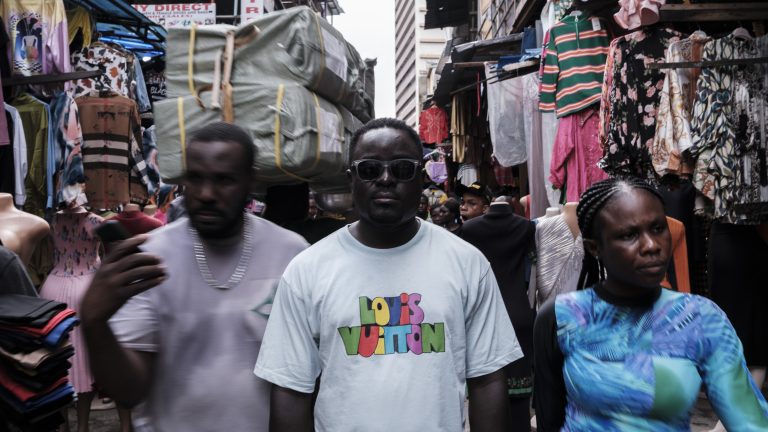
Back at Balogun Market, in a five-floor shopping mall called Rainbow Plaza, Lolade Giwa was interviewing a potential new attendant for her store. “My rules are simple: There must be at least one person in the store, and you must not steal from me,” Giwa said to the young man. Behind her was a large mirror, with rope lights around it illuminating the 10-foot-long space. The other walls had floor-to-ceiling wooden shelves, stacked with designer bags and shoes purportedly from Louis Vuitton and Gucci. Boxes with Chinese labels were arranged on one side, and Chinese-labeled clothes hung on a rail.
Giwa told Rest of World that business was booming and she’s planning to expand her store, which was why she needed to hire more help. She said she had met sellers via Chinese e-commerce platforms like 1688 and was now able to connect directly with manufacturers in China. She either buys whatever the manufacturers have in stock or gives them specifications for the products she wants, which they bulk-produce and then ship to her.
When the goods arrive in Nigeria, Giwa sells both to other retailers and directly to customers through an omnichannel approach. Besides her walk-in store, which she said helps build customer trust, she runs an Instagram business page and three WhatsApp groups, which she recently merged into a single community of over 700 members. Her store at Balogun Market serves as her office address. People either pick up their purchases in person, or order via direct message and get them delivered. Giwa said she averages 3–5 million naira ($3,700–$6,200) in monthly sales.
“When I clear goods, the minute I start posting, I run out of sizes and colors.”
Giwa said that quality, among other factors, determines the price of the products. One “Louis Vuitton” bag on a shelf behind her retailed for only 13,000 naira ($16) — the designer’s real bags start at around $1,300. She said she sometimes runs out of products as soon as she starts alerting customers to new arrivals. “When I clear goods, the minute I start posting, I run out of sizes and colors,” Giwa said.
Other shopkeepers around the Rainbow Plaza told Rest of World a similar story. Chidera Christian, 21, who manages two stores, said the business he works for makes approximately between 1 million and 3 million naira ($1,300–$3,900) per day, and averages 20 million naira ($25,000) in monthly sales. He said they restocked every four months, pointing to a bale of fake original shirts lying on the floor, which included replicas of brands like Versace, Louis Vuitton, and Burberry. Each of their three stores gets a container full of goods from China, and they retail both to wholesalers and individual customers, but strictly offline, said Christian.
He said customers prioritized textile quality over brand names and that his boss priced goods according to the quality of the material. One “Gucci” shirt was going for 5,000 naira ($6.50), while an unbranded T-shirt made of slightly thicker fabric was selling for 7,000 naira ($9).
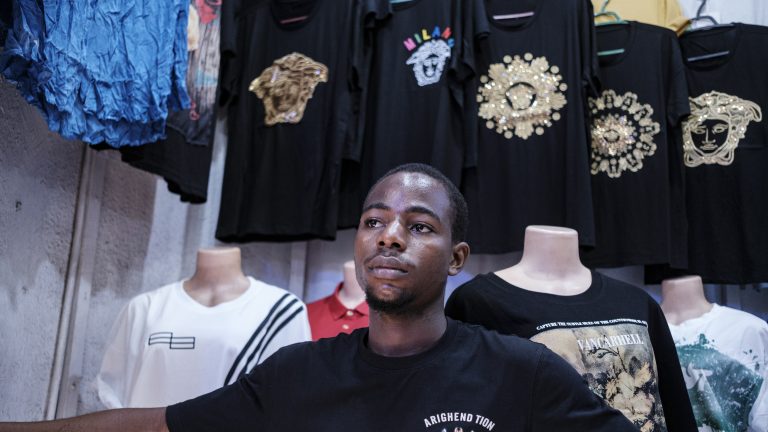
Some sellers don’t have a brick-and-mortar store at all, instead offering their wares exclusively over social media. Others have built a community of loyal customers on messaging apps like WhatsApp and Telegram: They first get commitments from buyers, then source products from DHgate, YiToo, and 1688 in a drop-shipping-style model, meaning they never actually store the goods but have them shipped directly to customers.
Social media seller Oluwatobiloba Adeshina, 23, told Rest of World she doesn’t have enough capital to open a shop, so she uses WhatsApp as a virtual store. Adeshina scouts products such as fake designer dresses, shoes, and bags on Chinese e-commerce platforms, and saves their pictures to advertise on her WhatsApp Status (a feature similar to Instagram’s Stories). Before she posts, she calculates a price that will earn her a profit. “I either add delivery fee to the price I’m posting the goods with or not,” Adeshina said. “But either way, I’m never at a loss because I don’t order until there are buyers. I’m what you can call a personal shopper.”
Adeshina used to source from wholesalers like Giwa before she discovered she could make more money going directly to platforms like AliExpress and 1688. “One day, when there’s enough capital, I want to also deal directly with manufacturers, open a store on Lagos Island, and stock up to sell to wholesalers and retailers,” she said.
The boom in Chinese e-commerce in Nigeria has also created a ripple effect in other parts of the supply chain. Logistics companies like Sky Cargo Ltd., Grace Logistics’ Ocean Freight, AAA Cargo International, Weight and Carry Express Cargo Limited, and Choice Airways offer logistics via air or ship. Sky Cargo has a warehouse in the heart of the Lagos Island market. This makes it easier to clear the goods, said a salesperson, who asked to remain anonymous.
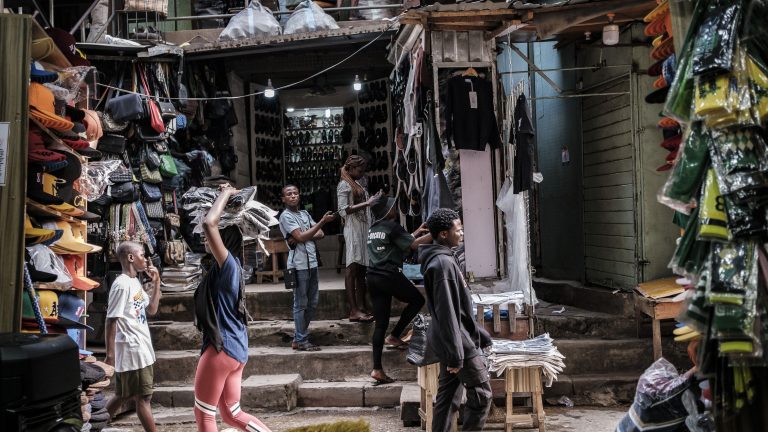
There is now little barrier to entry when it comes to buying from Chinese e-commerce platforms, with some existing traders also selling courses on how to navigate the sites, inspiring small-time traders like Adeshina to get involved.
Banah believes the market is becoming saturated as a result. More platforms are opening up to feed the global demand, and some local buyers are even learning Chinese to communicate more effectively with sellers, Banah said. To keep ahead of the curve, he has decided to move back to China, which he hopes will give him more clout and help him maintain his relevance as a mediator between Chinese manufacturers and their Nigerian clients. “Well, it’s up to me to reinvent myself,” he said.
